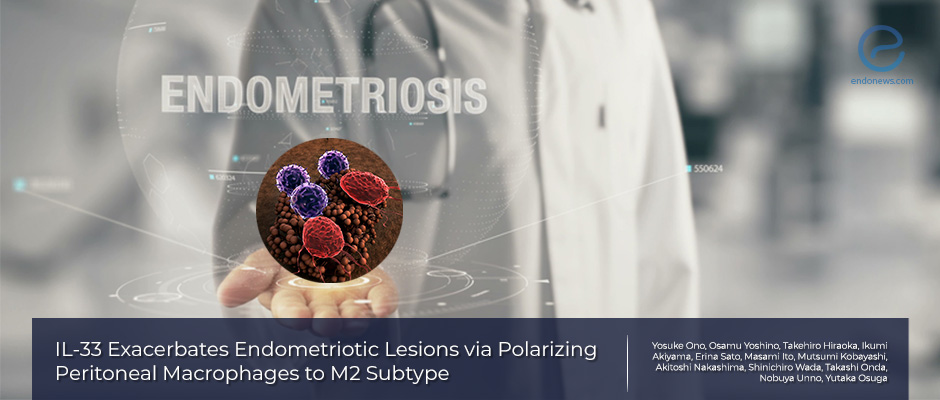IL-33 Polarize Peritoneal Macrophages for Endometriosis Growth
Apr 6, 2020
M2 macrophages: culprits for endometriosis enhancement
Key Points
Highlights:
- This study suggests IL-33 is a potential key factor to polarize macrophages to M2 type in endometriotic lesions.
- A new potential endometriosis therapeutic strategy could be planned by blocking endometrial stromal cell-M2 vicious cycle through IL-33.
Importance:
- The study elucidates a molecular mechanism using endometriotic stromal cells that involves the IL-1β-induced expression of IL-33 through p38 MAPK activation.
What’s done here?
- The expression of IL-33 in endometriosis lesions was assessed via immunohistochemistry and the concentration of IL-33 in cystic fluids of ovarian cysts and tumors was measured.
- Endometriotic stromal cells and M2 macrophages obtained from patients were used in in vitro experiments to understand the role of IL-33 and other key molecular factors involved in the worsening of endometriotic lesions.
Key results:
- The study confirms the expression of IL-33 in endometriotic lesions.
- IL-33 levels are higher in ovarian endometriomas compared to non-endometriomas.
- IL-33 levels were increased by IL-1β stimulation.
- IL-33 enhanced the polarization of macrophages towards M2 type as evidenced by increased expression of M2 markers: CD206, CD163, and IL-10.
- The study points to a positive feedback loop in endometriosis where IL-1β increases the expression of IL-33 to stimulate and polarize macrophages to M2
- Then, IL-1β increases the expression of IL-1β itself.
- The feedback loop elucidated in this study could be exploited to develop a new treatment strategy for endometriosis.
Limitations of the study:
- Lack of in vivo experiments to validate the in vitro data and establish the clinical relevance.
- Both endometriotic stromal cells and endometriotic epithelial cells expressed IL-33, but only endometriotic stromal cells were used in in vitro experiments.
- The authors showed that macrophages are in endometriomas, but they used the macrophages derived from peritoneal fluids to conduct this in vitro experiments.
Lay Summary
M2 type macrophages are the most common type of macrophages found in endometriosis and they enhance the development of endometriosis lesions. The key factors that stimulate macrophages to polarize towards M2 and contribute to the increased endometriosis lesions remain to be elucidated.
Interleukin (IL)-33, has been reported to stimulate several types of immune cells including macrophages and it is known to polarize macrophages to M2 type in wound healing and myocarditis. Moreover, high concentrations of IL-33 were shown in the serum and peritoneal fluids of women with endometriosis.
In this study, recently published in "Reproductive Sciences", Ono et al. hypothesized that IL-33 might have a role in the development of endometriosis lesions through the polarization of peritoneal macrophages towards M2 macrophages in patients with endometriosis.
They first confirmed the expression of IL-33 in both epithelium and stromal cells of endometriotic lesions and reported the higher concentrations of IL-33 in endometriomas compared to non-endometriomas.
In vitro experiments conducted using endometrial stromal cells showed that IL-1β induced IL-33 mRNA expression. Furthermore, IL-33 stimulation led to the polarization of peritoneal macrophages to M2 type, which increased the level of IL-1β.
Thus, this study elucidates a positive feedback loop that involves IL-33/ IL-1β and reports the role of p38 MAPK activation in endometriosis. The authors suggest that either blocking this loop or using a specific inhibitor for p38 MAPK might be used as new strategies to develop therapeutics for targeting endometriosis lesions.
Research Source: https://pubmed.ncbi.nlm.nih.gov/32046466/?from_single_result=32046466&expanded_search_query=32046466
endometrioma endometriotic lesions macrophages M2 macrophages

